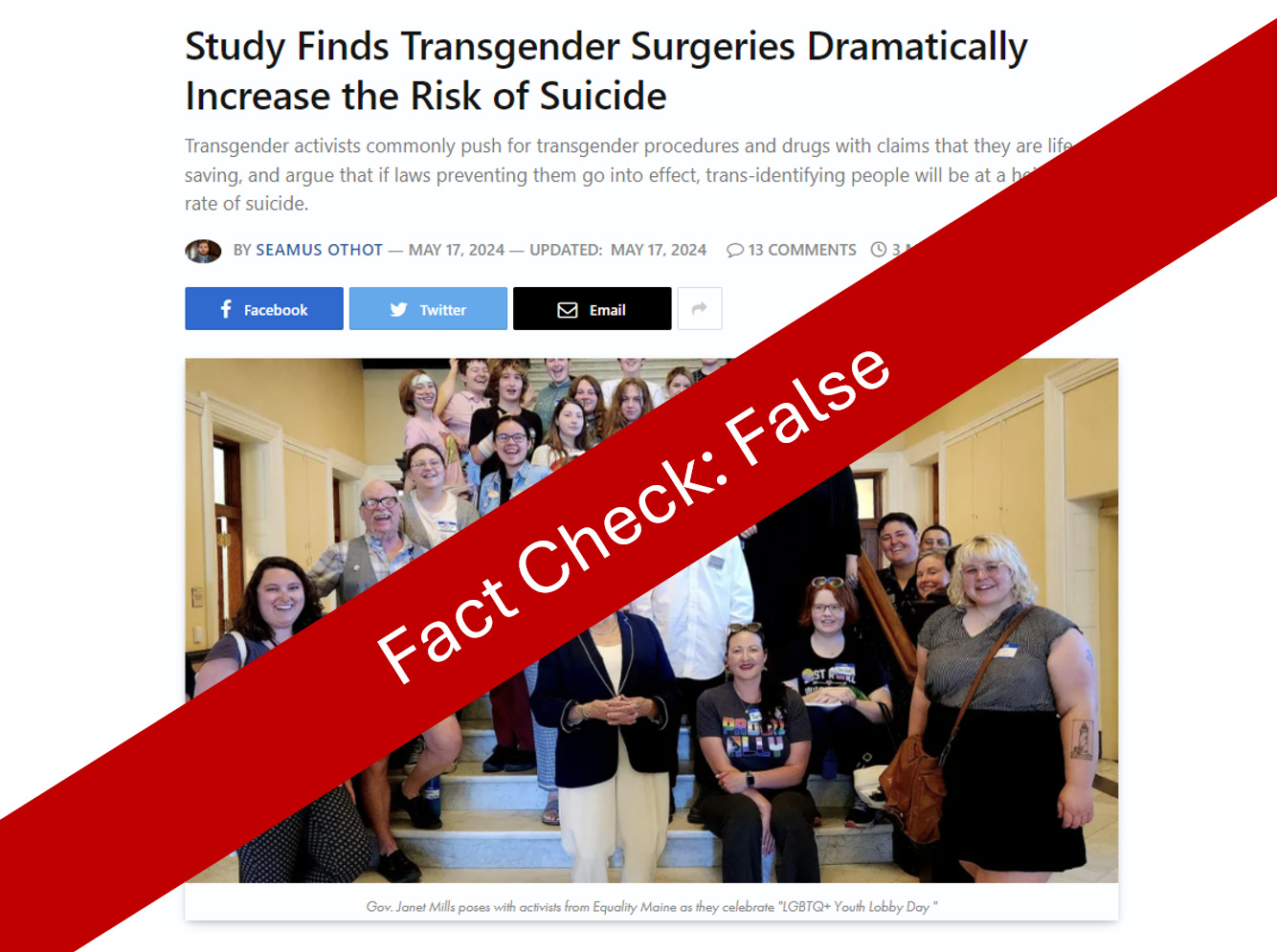Fact Check: No, A New Study Doesn't Show Trans Surgery "Increases Suicide"
A new study from a journal with poor reputation made the rounds claiming that transgender surgeries increase suicide. A fact check shows this assertion is egregiously false.
This weekend, multiple accounts and news stories were posted in far-right outlets claiming that a new study showed that “transgender surgeries dramatically increase the risk of suicide.” The claim, based on a study published in a pseudoscience journal, as determined by Media Bias/Fact Check, was then amplified by leading anti-trans accounts on the Twitter platform, including Elon Musk himself. Upon further review, the article appears to have made critical errors that were quickly caught by expert researchers in the science of transgender care, including an egregious error in which the wrong control group was selected for the study.
The study, titled “Risk of Suicide and Self-Harm following Gender-Affirmation Surgery,” was published in the journal Cureus in April but was only recently discovered by anti-trans influencers. Importantly, Cureus is a journal known for pseudoscience and disinformation. A Media Bias/Fact Check review determined that the journal “may publish unverifiable information that is not always supported by evidence.” The science journal watchdog organization Retraction Watch found that the journal “has retracted 56 papers” just two years after its inception. The journal is known for a poor-quality peer review process, and its motto is “peer review, not peer rejection.” Collectively, this increases the risk of major errors in publications from the journal.
The article looked at data from adults who had gender-affirming surgery and an emergency visit, comparing them with cisgender adults who had emergency visits. The study found that 3.5% of transgender adults who had surgery went to the emergency room for a suicide attempt, compared with 0.3% of cisgender controls. The study concluded that those with gender-affirming surgery had a 12 times higher risk of suicide attempts than patients with no history of gender-affirming surgery. That number was then posted on social media and pasted into headlines proclaiming that gender-affirming surgery increases suicide rates.
Researchers into trans healthcare quickly noted a glaring error: the authors compared transgender people who have had surgery with cisgender people to determine that gender-affirming surgery raises suicide risks. To accurately assess whether transgender surgeries increase suicide risk, the correct control group would be transgender people who did not have surgery or, even more accurately, those who were denied surgery. It would be like judging the effectiveness of a new teaching method by comparing college students using the new method to those who never went to college, rather than to college students using the old method.
In fact, the study’s conclusions take on an entirely different light when considering what current research says about transgender suicide attempt rates. The Williams Institute released a study showing that 42% of transgender adults report having attempted suicide over their lifetimes. The Journal of Interpersonal Violence put that number at 40%. A meta-analysis published in the Annals of General Psychiatry, which looked at 65 studies, found that the lifetime suicide attempt rate for transgender people is likely around 29%. Even if one uses the lowest number from these studies, it is clear that transgender people who have had gender reassignment surgery actually have a 10 times lower rate of suicide attempts in this study. Of course, no causal claim can be made either way using this study because the study declined to include such a control group. If they had, one could expect very different headlines to emerge.
The comparison of transgender people who have had surgery with cisgender people rather than other transgender people is a relatively common mistake used to make incorrect claims about the effectiveness of transgender care. Anti-transgender activists and politicians often cite, for instance, “the Swedish study” and incorrectly claim that it shows transgender care is ineffective, leading to a 19 times higher suicide rate. The study they cite, published in the journal PLOS One, used a similar control group of cisgender people. In that case, the control group selection was purposeful, used to evaluate health risks of transgender people compared to cisgender people. The author had to correct those misusing its findings, stating, “People who misuse the study always omit the fact that the study clearly states that it is not an evaluation of gender dysphoria treatment. If we look at the literature, we find that “several recent studies conclude that WPATH Standards of Care compliant treatment decreases gender dysphoria and improves mental health.”
Indeed, many studies show that transgender care saves lives and decreases suicidality. One study in the Annals of Plastic Surgery found that gender-affirming surgery “improved mental health outcomes” and “significantly reduced suicidal ideation.” Another study in JAMA Surgery determined that suicidal ideation was lower among transgender people who had gender-affirming surgery compared to those who did not. They also found that “respondents who underwent all desired gender-affirming surgeries had significantly lower odds of past-year suicide attempts.” Importantly, this study used the correct control group: transgender people who did not have all of their desired gender-affirming surgeries. A Cornell University review of gender affirmign care looked at over 50 papers and determined that “gender transition is effective in treating gender dysphoria and can significantly improve the well-being of transgender individuals.”
Despite this, many anti-trans influencers and far-right media outlets amplified the incorrect claim that transgender surgery increases suicides. The Babylon Bee posted, “Risk of suicide increases 12x after ‘gender-affirming’ surgery ... is anyone surprised?” Elon Musk then amplified the article, saying, “extremely concerning.” The post was viewed over 26 million times. Anti-trans accounts such as Seth Dillon, Chad Felix Greene, Jonathan Kay, and Katy Faust also amplified the incorrect claim. Jordan Peterson used the study to claim that doctors were “butchers.” Far-right conservative media such as The Daily Wire and Breitbart made similar incorrect claims of increased suicide rates.
Disinformation around transgender care is easily weaponized by politicians relying on social media to justify their political decision-making processes. None of the posts about the study received any community notes on the Twitter platform, despite many being submitted to correct the error. This is a serious failing of the Community Notes feature, which is supposed to correct misinformation. As a result, incorrect information about transgender care has been allowed to spread with little pushback, reaching tens of millions of people. Fact-checkers and those who run platforms should better protect their platforms against this kind of egregious disinformation.





We're going to continue to see these tactics of flooding the field with false information and poor studies. Nevermind the hundreds of studies that support transgender care (Eyeroll). They will keep trying to pull out that "one" article, trying to wave it triumphantly before the masses and are quickly shot down by legitimate researchers and studies. The vast majority of studies supports transgender individuals and their identities.
There is some really sad data entangled in all of the misinformation (trans care helps but regardless, data suggest that being trans can be tough). A civilized people would see that and want to help.